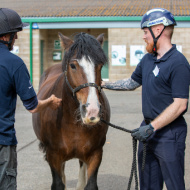
World Horse Welfare helps RSPCA recruits.
World Horse Welfare, the UK's largest equine rescue and rehabilitation organisation, has teamed up with the RSPCA to prepare new RSPCA inspectors with training on how to assess and handle horses.
The latest intake of animal rescue officers were offered theory and practical training at World Horse Welfare's Hall Farm and Penny Farm rescue centres, in order to be prepared when dealing with horse welfare concerns.
Melanie Fisher, RSPCA inspector for Learning and Development, said: “Dealing with any animal involves risk and horses are large animals with high risk, so learning how to handle them safely and effectively is essential.
“Learning how to approach horses in the stable and in the field, and to assess their body condition is so useful.
“To be able to come to a World Horse Welfare farm and gain knowledge and expertise from them in an area they excel in has been invaluable. World Horse Welfare is a great partnership for us, we value their expertise in the equine field.”
Spending two days at one of the farms, new RSPCA inspectorate recruits spend one day learning how to approach horses in the field and in stables, as well as how to hold and examine them safely.
On the first day recruits also learnt how to lead a horse, what to look for when assessing a horse's condition, and dealing with difficult horses.
Rounding up and loading horses onto transport was covered on the second day, as well as a mock practical case to pull together all the learning.
The course also featured classroom sessions on topics such as euthanasia and trespass laws.
Jon Phipps, course leader and deputy chief field officer at World Horse Welfare, commented on the collaboration: “We all bring different specialities to the table and we need that breadth of knowledge and experience.
“We aim to repeat this course and to continue for each new intake, to develop this partnership for the benefit of horse welfare.
“Collaborative working between the equine charities is now the norm, particularly on large cases.
“We can meet each other and see how each other works and how the teams operate, because these are the guys we will be calling out if we need them, and vice versa.”
Image (C) World Horse Welfare



 The RCVS has announced a new version of its 1CPD mobile app, with enhanced features for veterinary surgeons and veterinary nurses to record their continuing professional development.
The RCVS has announced a new version of its 1CPD mobile app, with enhanced features for veterinary surgeons and veterinary nurses to record their continuing professional development.